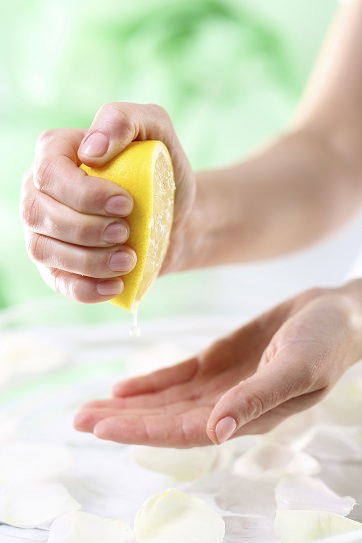 The world of natural acne treatments is divided into three competing factions.
The world of natural acne treatments is divided into three competing factions.
First, you have the multi-billion dollar, mega-entrenched standard dermatology treatments which are supported by a ton of science but not so much by a ton of success stories. These are dished out to acne patients everywhere, and include benzoyl peroxide, Accutane, and antibiotics. The rule with this group is stay away!
Faction 2 is plants, foods, herbs, and nutrients which are supported by indirect scientific data and often stellar studies directly on acne, but haven’t cracked their way into mainstream dermatology yet. This faction includes raw honey, selenium, vitamin C, tea tree oil, and grapeseed oil, and is almost a never-ending gold mine for acne patients.
Finally, we have the completely homemade acne treatments which aren’t based on any scientific data, but are based on logic, ancient wisdom, and old fashioned common sense (or uncommon sense).
This is the most treacherous group of all to explore. You have the likes of toothpaste, said to dry angry pimples out superbly but actually full of inflammatory chemicals. You have baking soda masks, an old favourite for acne which is actually way too alkaline for healthy skin.
But then you have things like pomegranate. I long claimed that its compounds would be beneficial when applied topically, and it’s now official according to this study.
With this group you’re in the dark, relying on your own wits, but it’s possible to stumble across something amazing…
…and if you believe everything you read on the internet, lemon juice is one of those amazing homemade acne treatments. The liquid squeezed straight from a fresh lemon is among other vague claims, said to 1) fade away acne scars, 2) wipe out acne bacteria, and 3) put an end to oily skin.
But is lemon juice really an effective and above all cheap acne remedy? The answer is no.
Lemon juice can wreck photosensitising havoc
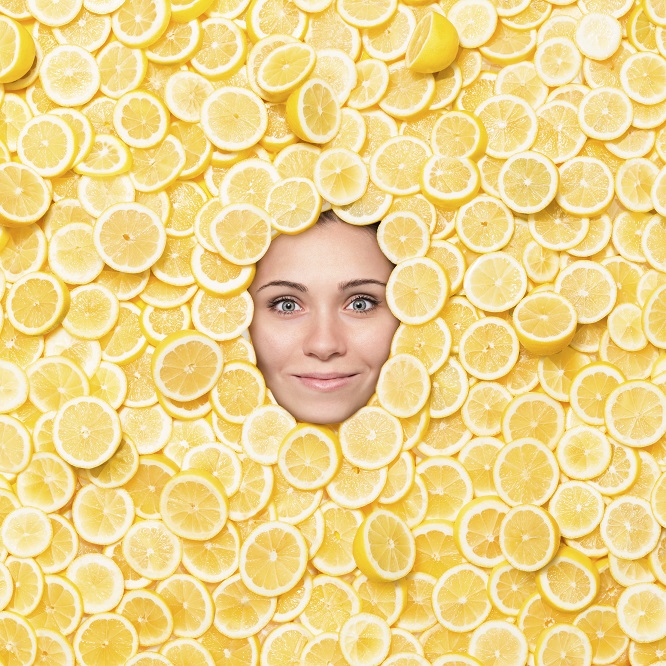 One acne-clearing enthusiast on the internet was quoted as saying that lemon juice is “100% natural – so there’s no risk of side effects, wahoo”.
One acne-clearing enthusiast on the internet was quoted as saying that lemon juice is “100% natural – so there’s no risk of side effects, wahoo”.
That’s rubbish, because natural doesn’t guarantee safe; just look at cocoa butter. It’s a pore-clogging monstrosity, though it has some good points.
Lemon juice is one such dodgy natural acne treatment and you’ll find out why now. Firstly, lemons and hence the juice are potent sensitizers of human skin to ultraviolet light.
Read Annihilate Your Acne – get the diet that could transform your skin!
Lemons as well as some other citrus fruits are rich in compounds known as furocoumarins. One of them, called psolaren, has fascinating properties. It’s completely safe to apply to the skin… in darkness that is.
However, when psoralen is exposed to UV radiation, its electrons absorb the sun-derived energy and the compound swells up to 3 times its normal size. Eventually, the psoralen molecules release all this stored energy, releasing a burst of intense heat and radiation.
The problem is that the lemon juice is now on your skin, and the result of this explosion to your naked eye is a red rash, or other forms of inflammation.
The burst of energy is strong enough to kill off skin cells on the upper layers of your skin and cause deadly DNA mutations. What’s more, lemon juice is notorious for making human skin significantly more sensitive to sunlight. Symptoms can be burning, irritation, blistering, itching, and worst of all, added inflammation to existing acne and pimples.
Another common result is the much-feared hyperpigmentation, a discolouring of patches of skin. Lemon juice is actually touted by many as a skin lightener. Many recommend it to remove existing acne scars for that reason. But the mutating effects of psolaren can lead to the colour of your skin growing even more messed up if you apply it with anything less than expert precision.
Hyperpigmentation is reversible, but occasionally permanent. Consider permanent sunburn marks. Have you ever had sunburn so bad on the beach one day that ten years later, you still have dark patches dots all over your back? Or the reverse – occasionally you get white spots in former sunburn patches?
The threat of hyperpigmentation is real and lemon juice can cause it.
Lemon juice – a great source of burning acid
 What’s more, the furocoumarins aren’t the only danger to your skin’s integrity – the high acidity of lemon juice is another risk factor.
What’s more, the furocoumarins aren’t the only danger to your skin’s integrity – the high acidity of lemon juice is another risk factor.
On this website I’ve previously criticised alkaline acne treatments like baking soda and bentonite clay, which are promoted as “healing”. The problem is that while excess acidity across the whole human body is bad, since it has a roughly neutral PH, your skin is designed to be acidic.
Your skin’s acid mantle is vital for preventing the overgrowth of pathogenic bacteria, including acne bacteria, and providing a firewall against infection, incinerating them like a comet is incinerated by the earth’s atmosphere.
Next – the 6 best vitamins and minerals for naturally clear skin
Disruption to the skin’s acid mantle results in skin irritation and weakens overall skin barrier function. Alkalinity increases the risk, but so does too much acidity…
…and that’s what lemon juice causes. Human skin has a PH of 4-4.5, lemon juice has an average PH of 2.5.
There’s nearly 50 commercial grown species of lemon in the world. 3 of the most common ones are the Meyer, Eureka, and Lisbon. Like any fruit, different varieties vary in their nutritional composition, and the PH is no exception.
But what all forms of lemon have in common is a juice that is far too acidic to place on your skin any more than occasionally without experiencing irritation, burns, and acne that is more prone to inflammation. The rough range of PH is 2-3.
Just try the drinking game where you chuck a whole lemon into your mouth, chew and suck the whole fruit dry of its edible contents, and then spit out the bare bones skin again. You’ll feel like you swallowed a bottle of sulphuric acid. Your teeth will feel dry and stripped down right to the raw calcium. In fact, tooth decay is a known side effect of eating too many lemons.
Lemon juice’s burning effects have shown up vividly on the acne patients who have dared to use it. One user claimed that “I applied it on my face and my face was red and stung very badly” while another experienced “pimples all over my face, this happened just two minutes after I applied the lemon juice”.
7 natural topical treatments which could transform your skin
To be fair, that second one is probably exaggerated, but the person’s clear shock (unless they were bribed by lime juice corp.) shows that lemon juice isn’t nature’s gift to skincare.
Even if lemon juice does have shocking acne benefits in other areas, the acidity disqualifies it from being anything other than a bi-weekly treatment.
The oily skin benefits (are all overstated)
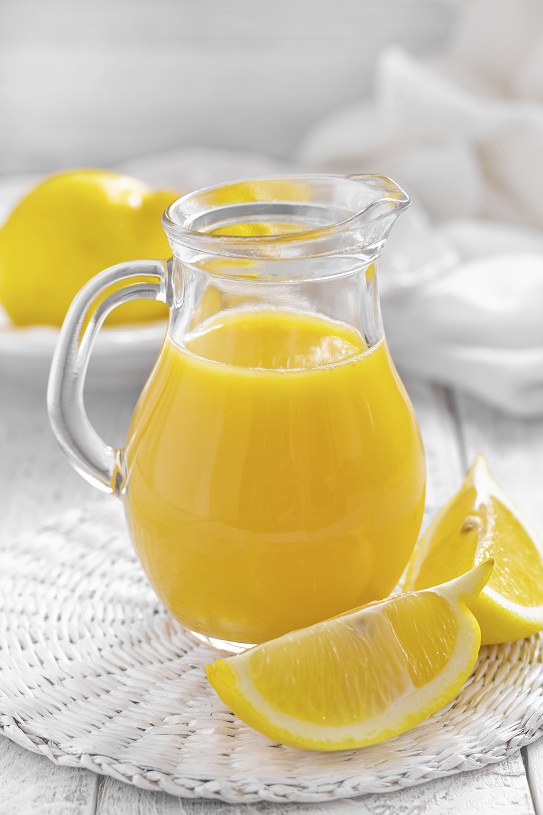 So far we have two major flaws for acne, which both boil down to significantly weakened skin against threats like sunlight and inflammation. Next we have the fact that lemon juice’s touted benefits for acne almost all fall short.
So far we have two major flaws for acne, which both boil down to significantly weakened skin against threats like sunlight and inflammation. Next we have the fact that lemon juice’s touted benefits for acne almost all fall short.
The theory about lemon juice reducing oily skin has been circulating the internet for years, and it most likely came from this study on nobiletin. Nobiletin is a flavonoid antioxidant found in a variety of citrus fruits like bitter oranges and blood oranges.
Nobiletin application in a cream was found to reduce both sebum production and the size of sebaceous glands. This led to the scientists concluding that “these results provide early evidence that nobiletin is an effective candidate for acne therapy”.
This study was conducted in 2007; since then skincare companies have unleashed various creams on the market. Chinese companies are also cashing in with some second rate versions. Some get good reviews, one user claimed that for oily skin, some nobiletin crystals from China “worked so well it’s scary”.
Why bread and pasta are a massive cause of acne
Sounds positive right? There’s two major flaws. Firstly, the study was performed on hamsters, who clearly aren’t human and don’t share the exact bacterial and nutritional make-up on the skin as us. It’s possible that the benefits will translate to human skin, but equally possible that they won’t. Aloe vera had a stream of positive studies on rats, rabbits, and hamsters, but then two human ones to deliver the final blow. Lemon juice doesn’t.
Secondly, the concentration of nobiletin are grossly insufficient to achieve the benefits of this study. The test subject was a nobiletin cream, the concertation in a whole lemon is likely around 0.1% at most; it’s probably far less.
Even if that low concentration of nobiletin is sufficient, many people who have experienced the effects of a weakened skin barrier first hand have also reported in on dry and peeling skin.
That’s a perfect recipe for increased sebum production, to restore the lost moisture and nutrient carrying capability. Nobiletin is also just one compound in the lemon fruit among thousands. Any other plant sterol, compound, or acid could neutralise its effects.
Unblocked skin pores is another claimed benefit, due to citric acid, a type of alpha hydroxy acid. AHAs have anti-aging and exfoliating properties, so it’s claimed that they could dislodge sebum clogging up the pores. The problem? AHAs are water-soluble. Sebum is a lipid, you need a fat-soluble substance to dissolve it. AHAs can exfoliate your upper layers of skin, but nothing more.
Lemon juice is devoid of any decent acne powers
The rest of lemon juice’s acne abilities fall short as well. First there’s the fact that it’s supposedly “rich in nourishing vitamin C”. Vitamin C is nourishing, but there’s no way you could say that lemon juice is rich in it.
A whole lemon fruit weighing 100 grams contains 53mg of vitamin C. A tablespoon, the likely quantity of lemon juice you’ll be applying to your face, contains approximately 10mg. There’s very little chance that such small amounts of vitamin C will accomplish enough to counteract the burning and skin barrier damage.
It is a great nutrient for the skin, though not as great as fat soluble antioxidant vitamins like vitamin E and A. Topical vitamin C can deactivate free radicals and increase collagen formation, specifically. Side effects are extremely rare; a yellow discolouring due to ascorbic acid being unstable and oxidising is the main one and hardly ever reported.
A study on the vitamin C derivative sodium L-ascorbyl-2-phosphate found that it caused a “statistically significant improvement” in acne when applied topically in 5% concentration. It’s great as a supplement for acne, but you can expect an article on the wonders of topical vitamin C very soon here…
Get the eBook – learn why eating fish can improve acne by 42%
…and I won’t be recommending lemon juice to obtain it. The small quantities will have a minor effect but not enough to make it worth your while. The study above used 5% concentration; lemon juice contains 0.03% concentration.
Next we have lemon juice’s antibacterial benefits, which exist without a doubt. Lemon juice is so acidic and strong that it destroys anything in its path…
…and that’s the problem. Lemon juice can wipe out p.acnes bacteria to an extent. That will benefit your acne by reducing targets for your immune system to launch inflammatory assaults against.
In my reckoning, this is the main reason why some people notice benefits for acne from lemon juice, not the pitiful vitamin C. But you’ll also massacre the acne-friendly bacteria on your face which are actually helpful for skin health.
There are many healthy strains on human skin as well as acne-promoting ones. Staphylococcus, for example, is one of the most common broad subsets of bacteria found in human skin flora. Staphylococcus strains can cause disease if they infect wounds, but some can also manufacture a molecule called lipoteichoic acid (LTA) which was proven in this study to inhibit the release of acne-causing pro-inflammatory chemicals.
That’s one example among many. Even p.acnes strains (there’s more than one) can defend against infectious bacteria; their reputation has been ruined by the one rogue strain that we all want to kill.
Topical application of friendly bacteria is actually an increasingly popular topical acne strategy. That’s why lemon juice is too much of a loose cannon to use regularly.
Topical toothpaste – another deadly homemade treatment
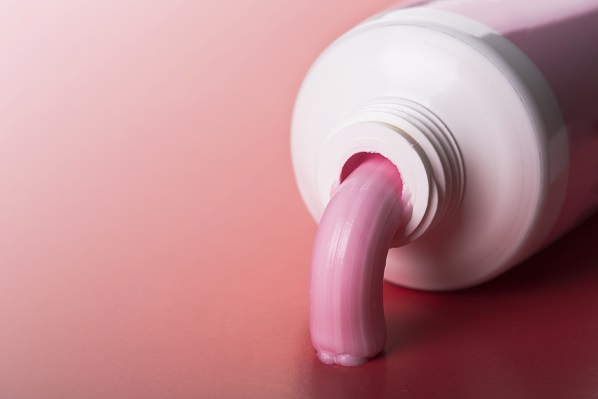 Hopefully you’ve got the gist of it – lemon juice is the definition of an overrated homemade acne cure.
Hopefully you’ve got the gist of it – lemon juice is the definition of an overrated homemade acne cure.
Another claim is that “lemon juice is the perfect acne treatment – so cheap that anybody can enjoy it and available from local grocery stores everywhere”. True those statements may be, but just because something is cheap doesn’t mean you should rush out and buy it with a bad case of special offer fever. A cheap price tag doesn’t change the fact that lemon juice is useless!
Another classic example of a homemade acne treatment which first developed in the underground and then burst into the mainstream is toothpaste. Somewhere over the last century, a desperate teenager with a party or date grabbed a tube of toothpaste, squeezed a blob onto their acne, and experienced a miracle. Now it’s recommended on acne forums, in magazines, by wise old family members…
…but the dark truth is that toothpaste is full of so many chemicals in so many different combinations that you’re most likely to inflame your acne. There’s sodium lauryl sulfate, a chemical that creates the frothy white mass and also creates inflammation. There’s sodium fluoride, the deadly enamel increasing agent. There’s the teeth whitener titanium dioxide, again linked to inflammation.
I put forward the theory in this article that the “drying out” effect against acne was due to triclosan, a chief antibacterial agent employed by commercial toothpaste. The problem is that most commercial toothpaste is so contaminated that its powers are lost. All toothpaste does for most people is make their acne more inflamed…
…and the final nail in the coffin is that triclosan is banned in most countries now anyway. The former mysterious power of toothpaste experienced by many people across the years is likely to be extinguished once and for all.
What does this all mean? It’s just another example of how homemade acne treatments cannot always be trusted. Now, I definitely don’t advise you to abandon any independent thought and become a cash cow for big pharmaceutical companies. One of the best things you can do to achieve the goal of permanently clear skin is to observe closely how individual acne strategies from websites like this impact YOU specifically.
Zinc – the number one mineral for clear skin (reduces acne by 49.8%)
No human body is exactly the same. But the point is, you should always perform a basic examination of the science, even if it’s just a brief internet search.
Remember – natural remedy gurus can be hungry for your cash as well! Always be on your toes.
Lemon juice skincare formulations – reviewed
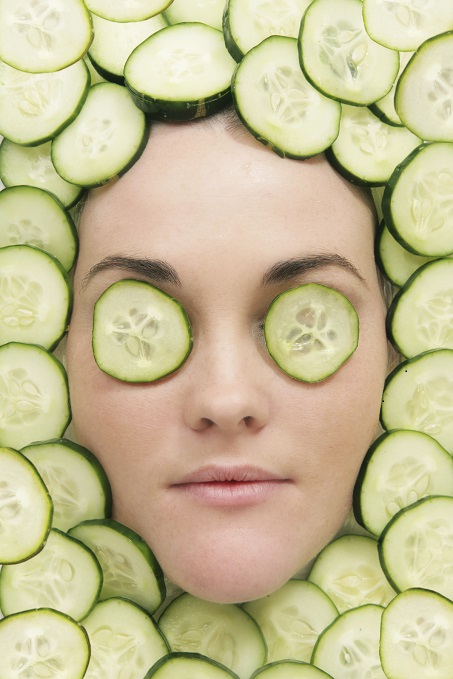 If you decided to take a chance and use lemon juice for acne, then you would simply grab a bottle, pour some onto a cotton bud, and dab it over your face. But many wannabe gurus recommend a variety of combinations, with the most popular being…
If you decided to take a chance and use lemon juice for acne, then you would simply grab a bottle, pour some onto a cotton bud, and dab it over your face. But many wannabe gurus recommend a variety of combinations, with the most popular being…
Lemon juice and honey – I would not advise wasting your raw honey supply on this. Raw honey is a brilliant acne treatment, manufactured by the good old bees who scientists reckon would trigger the apocalypse if they went extinct. It has three known antibacterial compounds, a decent supply of acne-clearing antioxidants, and some trace minerals.
However, it won’t counteract the dangers of lemon juice in any way. Honey has an average PH of 3.9, with some variance due to the many different plants bees use to make it. Honey doesn’t function by strengthening the skin barrier, it doesn’t deactivate the furocoumarins.
A lot of acne-clearing enthusiasts have enjoyed benefits from this, but guess what – it was probably the honey that helped them. Guard your precious honey, say no to lemon juice merchants.
Lemon juice and yoghurt –yoghurt has long been popular in India and the Middle East as a topical treatment. This is mostly due to its prebiotic bacteria content, with some prominent varieties being Lactobacillus acidophilus, Lactobacillus delbrueckii, and Bifidobacterium bifidum.
We know that good strains of p.acnes can keep the evil ones at bay. It’s believed that lactobacillus strains have benefits as well, though the science on human skin flora is nowhere close to fully explored yet (it’s an interesting topic). Yoghurt also contains small doses of the fat soluble nutrients vitamin A and E.
However yoghurt has a PH of 4, so it won’t counteract the acidity of lemon juice at all. Milk has a PH of 7 but the bacteria of the fermentation process consume of the lactose and churn out lactic acid in its place. The furocoumarins still exist, and the vitamin C is still tiny. Not worth the effort; you’d be better of trying yoghurt individually (bio live versions are looking interesting).
Lemon juice and cucumber – perhaps the best combination. Cucumber has a PH of 5.1-5.7 and will help to deactivate the acidity of lemon juice somewhat. However, it lacks strong acne-clearing powers of its own, with few antioxidants or nutrients of any kind.
It’s a myth that cucumber is great for acne, skin quality, or round circles under eyes. The only promising benefit is compounds called cucumber volatiles which may slow aging.
The other problem that these formulations possess is that they are so inconvenient. You have to mix the ingredients, add a thickener to allow them to rest on your face, and wait for the active components to absorb.
The easiest to apply is lemon juice itself, but that’s also the least effective, or in fact the most damaging.
Conclusion
Lemon juice is not a weapon against acne, it’s a weapon against clear skin. It’s also a weapon against the enjoyment of your life; if you did successfully enjoy a reduction in pimples, you’d have to become a creature of the darkness and never enjoy sunlight again.
There’s no point in using lemon juice at all. Some great topical treatments are raw honey, tea tree oil, witch hazel, green tea, grapeseed oil, and a variety of others.
Finally, never forget that diet and lifestyle are the real keys to unlocking the door of permanent clear skin. Topical treatments are the solution to going down on your acne with all the force you can possibly muster.
NEXT: discover the root causes of acne and banish your pimples forever
Thanks for reading!
Great article but I read it too late. I have blisters around the area I put the lemon on equal to the size of a quarter on my cheek. What do I do to heal it?
Keep any acidic treatments away from the area; elsewhere it depends what treatments you have in your cupboard. Your best bet is a natural anti-inflammatory treatment like aloe vera or raw honey. Otherwise, just wait until the imbalance subsides and remember not to use it again. Thanks for putting your story here as well! People need to stay away from this stuff. For some weird reason lemon juice is a mainstay of internet acne recipes but it’s one of the worst ingredients ever.
Used lemon juice for a month and how I regret it! My face has dark patches all over and my face was so hot, I thought I was burning. Please, how do I treat it?
It depends on the exact cause of the redness. If it’s inflammation, aloe vera or grapeseed oil will work. If it’s long-lasting hyperpigmentation, argan oil will work. Thanks for your story as well!
Never I mean never use Lemon I put on my face lord it burned. My skin start peeling it a red circle on my face. It’s painful Don’t Use
Lemon juice.
Thanks – these horror stories are everywhere.
Ive used Lemon Juice on my pimples once and left it overnight, the following morning the pimple was gone but left what looked like a red scar in its place with no skin on it, Is there any treatment to reverse or help this?
Hi Makc..
I did exactly the same and still have a red spot on my forehead (3 weeks) did you find a solution?
I squeeze some little amount of lemon into my cream that I was using but after a period I was getting cleared acne and cleared dark spot and little bit fairer than normal.
After some months I discovered that I was getting darker in complexion then I stopped using the cream mixed with lemon.
What treatment can I use to get back my normal complexion back?
An anti-hyperpigmentation remedy such as argan oil may work.
How can one maintain the natural of the skin? Are there any topicals you could recommend?
What do you mean by the natural of the skin? Clearing acne naturally? If so, simply read the article called the “the top 7 topical treatments for clearing acne naturally” on this website.
Found your article after I decided to put lemon on my face. We have a lemon tree and I was making some lemon water and thought, “why throw away the lemon rind, I should rub it on my face!” So I did, along with some of the oil from the peel. I noticed I have a weird rash now, but it didn’t appear until an entire day later. Shouldn’t it have happened immediately? I am trying to figure out what the culprit is for this random rash and this is the only thing I did of out ordinary. My skin is acne prone but also not sensitive whatsoever. I can’t even remember the last time I actually had a rash, definitely more than 20 years ago!
Not necessarily; maybe lemon juice weakened your skin’s resistance to sunlight, and spending time in the sun the next day triggered it.
Wow… Thank God I found this article but not too late for me. I just applied lemon juice on my face tonight, immediately reading this. I quickly wash my face. I hope I don’t have any side effect by tomorrow
You’ll be OK, unless your skin is unusually sensitive. Plus you haven;t been exposed to any sunlight yet, so there hasn’t been any chance for the psolaren to expand and burst. If you washed the lemon juice away quickly then it won’t have been absorbed into your skin cells yet either.
I think I’m having allergic reaction from the lemon juice from Concentrate drink. My face is constantly burning my fingertips is burning last night, I experience my fingertips Burning really bad then White marks appeared on my fingertips as if I put my hands on a hot slove, and I’m also getting darker then my usual complexion. Could it be the lemon juice.???????
Possibly! If you’ve never used it before then maybe. If you have and noticed no problems then obviously it’s something else.
What about citric acid as an ingredient in a product?
It’s safe, it’s like a much milder version of the oxfoliation ingredient glycolic acid. The problems of lemon juice aren’t related to citric acid.
I’ve rubbed lemon on my face. My skin is super sensitive. Before this lemon treatment my skin was super soft and even toned without a single pimple.
Moral of the story: never put lemon on face!!!!! It’s been 2 months though the flaky ness is gone, my forehead has become super oily and I still see small pimples. Please HELP!
PLEASE!!!
But lemons are a good food to incorporate into our diet, right?